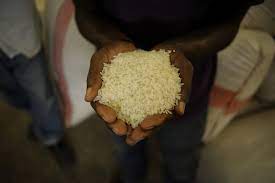
KEBS flags 2,000-tonne rice consignment for failing aflatoxin test » Capital News
NAIROBI, Kenya, Dec 11 – The Kenya Bureau of Standards (KEBS) has flagged 2 million kilograms of rice as unfit for human consumption after it failed aflatoxin tests.
The standards bureau said the flagged consignment, imported from Pakistan in September and October, was found to contain aflatoxin levels exceeding the permissible limit.
A KEBS report stated that the rice contained 11.54 parts per billion (ppb) of aflatoxin per kilogram, while the allowable limit is only 5.0 ppb per kilogram, making it unsafe for human consumption.
The consignment, consisting of 83,000 bags of 25 kg each, was transported from the Kilindini port in Mombasa to Nairobi, where it was repackaged and distributed to various wholesale and retail outlets.
So far, KEBS officials have managed to seize only 23,000 kilograms of the rice, leaving over 50,000 kilograms already in the market, exposing Kenyans to potential health risks.
Market surveillance officers from KEBS confiscated the contaminated rice at the Central Business Park in Nairobi’s industrial area.
Aflatoxins are a group of toxins produced by certain fungi that grow on agricultural crops such as maize, peanuts, cottonseed, and tree nuts.
High doses of aflatoxins can lead to acute poisoning (aflatoxicosis), which can be life-threatening and usually involves severe liver damage.
Aflatoxins are also genotoxic, meaning they can damage DNA and have been linked to cancer in animal species. Evidence suggests that they can cause liver cancer in humans as well.
The main fungi responsible for producing aflatoxins are Aspergillus flavus and Aspergillus parasiticus, which thrive in warm and humid climates.
About The Author